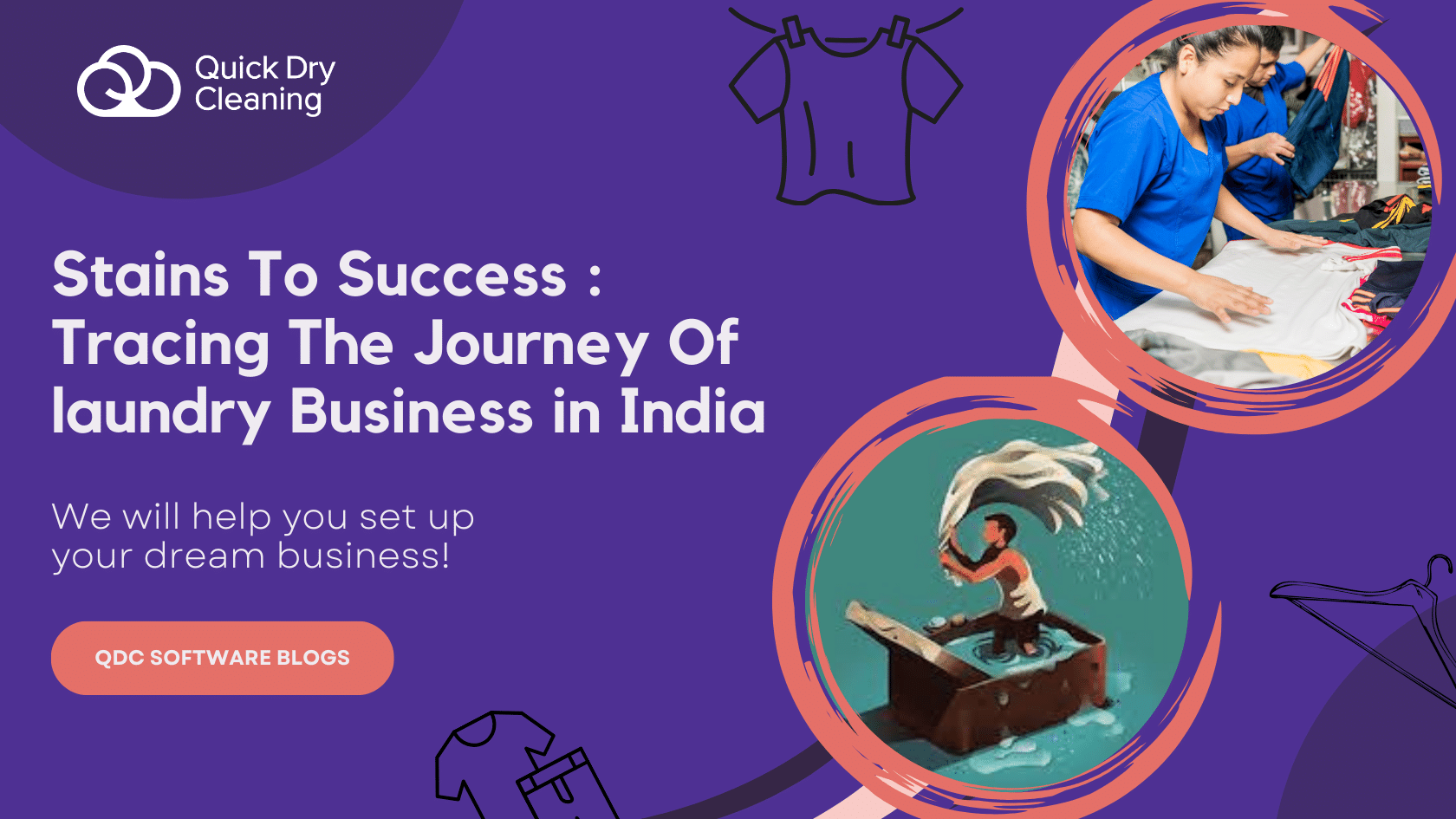Introduction :
In the vibrant Fabric of India’s entrepreneurial landscape, the laundry industry has woven itself into a tale of resilience and success. From humble beginnings to becoming a crucial service, the journey of laundry services in India is a testament to adaptability and innovation.
The laundry industry in India has undergone a remarkable transformation over the years, evolving from a mundane household chore to a thriving industry. This journey from suds to success is a testament to the changing lifestyles, economic dynamics, and entrepreneurial spirit in the country. In this blog, we will delve into the fascinating journey of the laundry business in India, exploring its historical roots, challenges faced, and the innovations that have propelled it into a flourishing industry.
The Early Days :
In the not-so-distant past, laundry services in India were primarily localized, relying on manual labor and rudimentary washing techniques. However, with the surge in urbanization and changing lifestyles, the demand for professional laundry services began to escalate.
The history of laundry in India is deeply entrenched in cultural practices. Traditionally, laundry was a domestic chore, with families hand-washing clothes by rivers or in communal spaces. As urbanization and the pace of life accelerated, the need for professional laundry services grew exponentially.
Check out the scope and growth graph here : https://www.techsciresearch.com/report/india-laundry-service-market/
The laundry industry in India faced numerous challenges during its nascent stages. One of the primary hurdles was the cultural reluctance to outsourcing a task considered deeply personal. Many viewed laundry as a household responsibility, and trusting an outsider with this job required a shift in mindset. Additionally, the lack of standardized processes and quality control posed challenges in establishing credibility.
The journey of laundry industry in India often begins with a small establishment, catering to local communities. They were manual, time-consuming, and lacked the efficiency required to meet the growing demand.
The start of commercial laundry services, however, began with the changing dynamics of urban life. In the mid-20th century, as cities expanded, the demand for time-saving services surged, giving birth to the professional laundry sector
Rise Of Dhobis :
The term “Dhobi” has become synonymous with laundry in India. Local dhobis, or washermen, played a pivotal role in meeting the laundry needs of communities. They created a unique niche by providing personalized services, often collecting and delivering clothes right at the doorstep.
In the mid-20th century, small-scale local laundries began to emerge, catering to the needs of their immediate communities. These establishments relied on manual labor, large washing drums, and basic drying techniques. While they provided a valuable service, these traditional laundries faced significant challenges in scaling their operations and maintaining consistent quality.
The emergence of colonial rule under The British Government brought with it the introduction of washing machines and modern laundry techniques. However, it wasn’t until the late 20th century that the laundry industry began to take a more organized and commercial form.

Challenges Faced By Laundry Industry :
While the laundry industry in India has witnessed remarkable growth, it has not been without challenges. Water scarcity, power fluctuations, and the need for eco-friendly practices are hurdles that the industry continues to address. Let’s look at some of the major challenges given below :
-
- Scalability Issues – Hand-operated laundries struggled to scale operations to meet the rising demand, leading to service limitations.The labor-intensive nature of washing and drying limited their capacity, hindering expansion beyond local markets.
-
- Quality Concerns – Manual processes introduced variations in washing techniques, leading to inconsistencies in the quality of the laundry. From uneven stain removal to fabric wear and tear, maintaining a high standard was a persistent challenge. Inconsistencies in washing techniques and manual errors often resulted in compromised laundry quality.
-
- Logistical Challenges – Timely delivery and effective inventory management proved to be significant logistical hurdles. Coordinating pick-ups, processing orders, and ensuring on-time deliveries posed considerable hurdles for traditional laundry businesses.
The Economic Boom and Changing Lifestyles:
The late 20th century witnessed a significant economic boom in India, accompanied by a rise in disposable incomes and a shift in lifestyle patterns. As urbanization and hectic work schedules became the norm, individuals found themselves with less time for household chores.
This shift in lifestyle became a catalyst for the growth of laundry services, with busy professionals and families seeking convenient solutions for their laundry needs.
Entrepreneurial Initiatives:
The success of the laundry industry in India is also credited to the entrepreneurial initiatives that emerged to address the evolving consumer demands. Small-scale laundry services began cropping up in urban areas, offering pick-up and drop-off services, and leveraging technology to streamline operations. This marked the beginning of a more organized and customer-centric approach to laundry services.
Technological Intergation :
The 21st century brought with it a wave of technological advancements, and the laundry industry was quick to embrace these innovations. Mobile applications and online platforms emerged, allowing users to schedule laundry pickups, track orders, and even customize their preferences. This not only enhanced customer convenience but also provided laundry businesses with valuable data for improving efficiency.
QDC emerged as a key player in this transformation, offering comprehensive Laundry Management and Automation POS System solutions tailored to the unique needs of the Indian market.
Customer-Centric Approach :
One of the cornerstones of success for any business is a customer-centric approach. Laundry services in India are realizing the importance of customer experience in building brand loyalty. Quick turnaround times, transparent pricing, and responsive customer service are becoming differentiators in this competitive market.
We have a detailed blog explaining the benefits of customer centric approach, check it out here : https://www.quickdrycleaning.com/customer-centricity-in-laundry-business/
Franchising and Chain Models:
The laundry industry in India saw a significant boost with the introduction of franchising and chain models. Established players in the market began expanding their reach by offering franchise opportunities, enabling entrepreneurs to enter the industry with the backing of a reputable brand. This not only standardized the quality of services but also created a sense of trust among consumers.
Find out more about franchising and its benefits here : https://www.quickdrycleaning.com/franchising-your-laundry-business/
Green Initiatives and Sustainability:
In recent years, there has been a growing awareness of environmental issues, prompting the laundry industry to adopt more sustainable practices. Many laundry services in India have shifted towards eco-friendly detergents, water-saving technologies, and energy-efficient equipment. This not only aligns with the changing consumer preferences but also contributes to the industry’s overall positive impact on the environment.
Future Prospects:
The laundry industry in India continues to evolve, with a promising future ahead. As the demand for convenient and efficient services grows, the industry is likely to witness further innovations, from automated laundry facilities to the integration of artificial intelligence for predictive maintenance and personalized customer experiences.
Conclusion:
The journey of the laundry industry in India from stains to success is a captivating tale of adaptation, innovation, and entrepreneurship. The journey of laundry business in india is marked by evolution and adaptation, from local dhobi’s making thier way into communities to tech savvy, eco-concious services of today, the indsutry continues to redefine itself.
From the traditional methods of manual washing to the digital era of mobile apps and sustainable practices, the industry has come a long way. As it continues to respond to the changing needs of consumers, the laundry business in India stands as a shining example of how an age-old chore can transform into a dynamic and flourishing sector.
As the laundry business continues to flourish, QDC remains a trusted partner, steering businesses towards success. From digital transformation to enhanced customer experiences, the impact of QDC’s laundry automation and management POS systems resonates across the industry, creating a ripple effect that extends to every entrepreneur who dares to dream big in the world of laundry services.
Together, let’s celebrate the success of laundry businesses in India!





















































